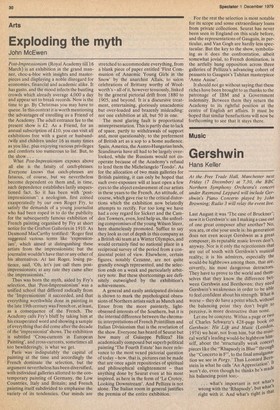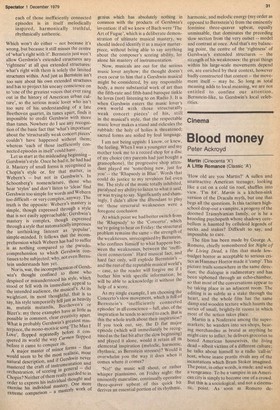Music
Gershwin
Hans Keller
At the Free Trade Hall, Manchester next Friday (7 December) at 7.30, the BBC Northern Symphony Orchestra's concert under Raymond Leppard will include Gershwin's Piano Concerto played by John Browning; Radio 3 will relay the event live.
Last August it was The case of Bruckner'; now it is Gershwin's: am I making a case out of one great composer after another? No, you are, or else your uncle is: his generation does not even accept Gershwin as a great composer; its reputable music lovers don't, anyway. Nor is it only the rejectionists that are out of touch with Gershwin's musical reality; it is his admirers, especially the would-be highbrows among them, that are, covertly, his most dangerous detractors. They have to prove to the world and themselves that they know the difference between Gershwin and Beethoven; they need Gershwin's weaknesses in order to be able to feel confident about his strength. What is worse -they do have a point which, without the balancing point they don't begin to perceive, is more destructive than none. Let me be concrete. Within a page or tvi° of Charles Schwartz's 428-page book oh Gershwin: His Lift and Music (London, 1974) we hear, not from him, but the musical world's leading would-be highbrow himself, about the 'structurally weak concert pieces like the "Rhapsody in Blue" through the "Concerto in F", to the final arnalgatna° tion we see in Porgy.' This Leonard Bert' stein in what he calls 'An Appreciation'. it won't do, even though he thinks he's made his balancing point too: . . what's important is not what:s wrong with the 'Rhapsody', but what right with it. And what's right is that each of those inefficiently connected episodes is in itself melodically inspired, harmonically truthful, rhythmically authentic.
Which won't do either -not because it's wrong, but because it still misses the centre of what's right with it'. Bernstein just won't allow Gershwin's extended structures any rightness' at all qua extended structures: what's right with them is solely the limited structures within. And just as Bernstein isn't too sure about his own extended structures and has to project his uneasy conscience on to 'one of the greatest voices that ever rang out in the history of American urban culture', so the serious music lover who isn't too sure of his understanding of a late Beethoven quartet, its tunes apart, finds it impossible to credit Gershwin with more than tunes. Nowhere do I see any recognition of the basic fact that 'what's important' about the 'structurally weak concert pieces' couldn't have happened without them; whereas 'each of those inefficiently connected episodes in itself' could have. Let us start at the misleading beginning -Gershwin's style. Once he had it, he had had it. Mastery of small forms is recognised in Chopin's style or, for that matter, in Webern's -but not in Gershwin's. In Schoenberg's nomenclature, those who hear 'styles' and don't listen to 'ideas' find Gershwin too simple for words and Webern too difficult— or very complex, anyway. The truth is the opposite: Webern's mastery is simple, though expressed through a style that is not easily approachable; Gershwin's mastery is complex, though expressed through a style that automatically impresses the unthinking listener as 'popular', simple-minded. It follows that the incomprehension which Webern has had to suffer is as nothing compared to the pseudocomprehension to which Gershwin continues to be subjected; why, not even Bernstein understands him yet. Nor is, was, the incomprehension of Gersh win's thought confined to those who despised or misunderstood his style, which stood or fell with its immediate appeal to the intended audience, the musical's. At its weightiest, its most thoughtful, that is to say, his style temporarily fell just as heavily as, mutatis mutandis, Beethoven's or Bizet's; my three examples have as little as possible in common, clear creatty apart. What is probably Gershwin's greatest mas terpiece, the mono-motivic song i 'The Man I Love', flopped repeatedly before. t conquered its world the way Carmen flopped before it came to conquer its. A major master of minor forms, — that would seem to be the most realistic, most natural description, and if Gershwin never mastered the craft of instrumentation and orchestration, of scoring in general -did Chopin? Neither of them really needed to in order to express his individual thought and exercise his individual mastery. One more extreme comparison — a masterly work of genius which has absolutely nothing in common with the products of Gershwin's invention: if all we knew of Bach were 'The Art of Fugue', which is a deliberate demonstration of ultimate musical mastery, we should indeed identify it as a major masterpiece, without being able to say anything about the composer's scoring ability, let alone his mastery of instrumentation.
Now, musicals are out for the serious music lover anyhow; the thought doesn't even occur to him that a Gershwin musical might be 'considered, by any responsible body, a more substantial work of art than the fifth-rate and fifth-hand baroque tinkle he loves (not) listening to on Radio 3. It is when Gershwin enters the music lover's own world with those structurally weak concert pieces' of his, still in the musical's style, that the respectable music lover makes a stand and ridicules the rubbish: the holy of holies is threatened; sacred forms are soiled by foul language.
I am not being uppish; I know, or knew, the feeling. When I was a youngster and my mother took me to a record shop for a disc of my choice (my parents had just bought a gramophone), the progressive shop atten dant played me 'something new, just for you' -the 'Rhapsody in Blue'. Words that could do justice to my revulsion fail even me. The style of the music totally inhibited, paralysed my ability to listen to what it said, or was trying to say. Significantly and sham ingly, I didn't allow the attendant to play on: those structural weaknesses were a foregone conclusion.
At which point we had better switch from the 'Rhapsody' to the 'Concerto', which we're going to hear on Friday: the structural problem remains the same — the strength of the weaknesses, unrecognised by Bernstein, who confines himself to what happens between the weaknesses, between the 'inefficient connections'. Hard musical fact, and hard fact only, will explode Bernstein's -and the rest of the reputable musical world's -case, so the reader will forgive me if I bother him with specific information; he will be able to acknowledge it without the help of a score.
As my single example, I am choosing the Concerto's slow movement, which is full of Bernstein's 'inefficiently connected episodes' in all conscience -full, also, of the inspiration he tends to accord to each. But is this the whole truth about their inspiration? If you took out, say, the D flat major episode (which will immediately be recognised as the fast bit after the slow beginning) and played it alone, would it retain all its elemental inspiration (melodic, harmonic, rhythmic, as Bernstein stresses)? Would it overwhelm you the way it does when it comes where it comes?
'No!' the music will shout, or rather whisper pianissimo, on Friday night: the eminently masculine, continually operative three-quaver upbeat of this quick bit derives an essential portion of its rhythmic, harmonic, and melodic energy (my order as opposed to Bernstein's) from the eminently feminine three-quaver upbeat, equally unmissable, that dominates the preceding slow section from the very outset — model and contrast at once. And that's my balancing point, the centre of the 'rightness' of Gershwin's extended structures -the strength of his weaknesses: the great things within his large-scale movements depend on, are enriched by their context, however badly constructed that context -the movement itself -may be. So long as total meaning adds to local meaning, we are not entitled to confine our attention, Bernstein-like, to Gershwin's local celebrities.












































 Previous page
Previous page